

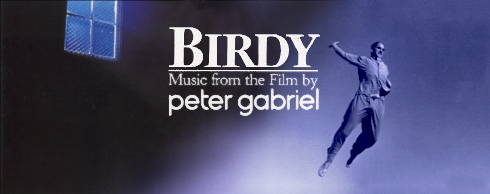
Peter Gabriel’s third solo album showed that he was very interested in creating moods, atmospheres and impressions with his music – more interested than in writing Top10 hits. Horst Königstein, who transferred Gabriel’s lyrics for the “deutsche album”, once described what Gabriel does as Hörfilme, audio-movies. Images are created in the head of the listener, and they immediately convey emotions. With such an approach and the density of expression he achieved it was only a matter of time before he would be asked to write a soundtrack.
Gabriel first got involved with a film score because its director, Alan Parker wanted him to do the job. Parker apparently found many of Peter Gabriel’s songs so well-suited for the film he was working on that asking Gabriel was the logical consequence.
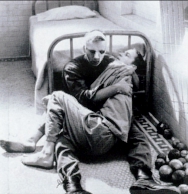 The film tells the story of two young men, the daredevil Al and the introvert Birdy who form a kind of impossible friendship. Their link breaks, though, and both end up in the Vietnam war. They meet again in a military hospital on their return – Al is injured, while Birdy is in a catatonic stupor. Only Al knows the secret: Birdy wants to be able to fly, or rather become a bird.
The film tells the story of two young men, the daredevil Al and the introvert Birdy who form a kind of impossible friendship. Their link breaks, though, and both end up in the Vietnam war. They meet again in a military hospital on their return – Al is injured, while Birdy is in a catatonic stupor. Only Al knows the secret: Birdy wants to be able to fly, or rather become a bird.
The aesthetic of Parker’s film is always down-to-earth and naturalistic, and always emotional. Pain, craving, and loss are components we encounter as well as energy and the urge to act. Peter Gabriel’s music fits into this world. The hero’s visions of flight and being a bird that always want to become real demand a special kind of fantasy. Gabriel manages to hit the right emotional spots with the music he provides. The result is eerie.
The album is completely instrumental. Alan Parker gave Peter Gabriel a list of songs he wanted to use. Gabriel re-arranged them and distilled their essence into a new version. These songs make up half the album. The other half contains new compositions. Three of them were not even in the film (Floating Dogs, Slow Water, Sketch Pad With Trumpet And Voice). Gabriel still included them in the album, and that’s good. For the music works without the film, it tempts you to create your own images from it, in a word: an audio-film.
The different emotions are represented by different musical styles. Quiet And Alone and Sketch Pad stand for the confused, disturbing part, Close Up and Under Lock And Key the quiet desperation, Slow Marimbas and Slow Water the confusingly hypnotic part and Birdy’s Flight and The Heat the hot, rhythmic emotions. All of these are facets of Peter Gabriel’s work.
The album demonstrates clearly for the first time to what extent Gabriel is able to rework existing song structures. Fans would later frequently (and annoyingly) come across the vast oceans of change and rearrangement in the world of Gabriel’s music.
The Birdy soundtrack is the bottom line, and perhaps the essence, of Peter Gabriel’s output of the early 1980s. Once more the human abyss, the exaltation and the devotion with which the devotee risks himself are assembled. Some of the soundscapes on this album are unique in Gabriel’s oeuvre.
Birdy is also the first time Gabriel worked with producer Daniel Lanois. They become a good team and achieve many things in terms of emotion and clarity. They would continue their cooperation on So, the album Gabriel had already been working on (with one year’s delay). He only got his record company to give him 12 months off to work on the soundtrack. A look at the credits shows that the musicians involved with Birdy are the ones with whom Gabriel already recorded his third and fourth albums.
For what it’s worth, though it was not used in the film, Floating Dogs would have its time to shine because it started every show of Peter Gabriel’s So tour.
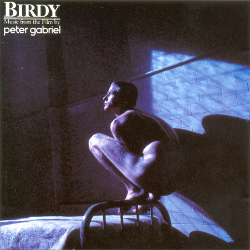 Another anecdote: There is a note on the Birdy album stating “this is a Realworld production” that prompted wild speculation as to the meaning. Some thought it meant that “the music is so weird that we need to point at the real world”, others felt that “you should not lose touch with the real world despite the music”. What the note really referred to was the Realworld studio, of course. It was the first mention of the studio that would grow big and lend its name to Gabriel’s record company RealWorld.
Another anecdote: There is a note on the Birdy album stating “this is a Realworld production” that prompted wild speculation as to the meaning. Some thought it meant that “the music is so weird that we need to point at the real world”, others felt that “you should not lose touch with the real world despite the music”. What the note really referred to was the Realworld studio, of course. It was the first mention of the studio that would grow big and lend its name to Gabriel’s record company RealWorld.
At Night
Gloomy thunders and crackles start off the album. Lots of echo and melodic turns, somewhere between eerie and dreamy.
Floating Dogs
Quiet breathing turns to mysterious craving before it grows into unexpected rhythms. Gripping.
Quiet And Alone
A collection of various elements, it is demanding, irritating, stagnant. Sounds like confusion and leaves you confused.
Close Up (from Family Snapshot)
55 seconds suffice to play through the verse part of the song from Melt. Simple and touching. In the film it is a motive for loss and love.
Slow Water
Gabriel’s keyboards hum, buzz and sigh a solemn sound scape that does, indeed, have elements of slow-moving water. There is something menacing in it, too.
Dressing The Wound
A melancholy introduction rings out brightly before it turns into sorrowful moaning. We hear Gabriel’s voice sing unintelligible words. This repeats twice before everything resigns to the introductory part again.
Birdy's Flight (from Not One Of Us)
A new introduction prefaces what is, essentially, the strong finale of the Melt song. Effective and strong.
Slow Marimbas
Several marimbas intertwine their melodies to make up an hypnotic dance. They change their lines almost imperceptively and draw you into it..
The Heat (from Rhythm Of The Heat)
A kind of short instrumental version of the Security song. No more, no less. The new mix of the drum finale (minimal changes) enhances the dynamism.
Sketch Pad With Trumpet And Voice
Sounds of pain and desperation are spread out on a gloomy droning background. Once more we hear Gabriel’s voice. The musical version of a heap of junk.
Under Lock And Key (from Wallflower)
Brightly tinkling e-piano plays the central motive of the song from Security. In the film it is the leitmotive for friendship.
Powerhouse At The Foot Of The Mountain (from San Jacinto)
The finale is an introduction that sounds like thunder grumbling from afar. It grows and develops into the finale of San Jacinto. Not breathtakingly original, but not really to depressing an ending.
All in all
A great collection of emotions for darker days. Highly recommended..
by Thomas Schrage, English by Martin Klinkhardt

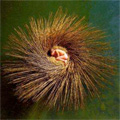

Multi-Artist-Album from 2000, with Elisabeth Frazer, Richie Havens, Paul Buchanan, Neneh Cherry and larla Lionáird. Gabriel himself sings on four.
Review available
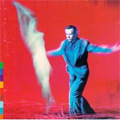

Peter Gabriel created a mixture of the World Music in Passion with the Mainstream of So.
Review Available